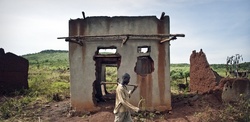How African politicians gave away $100bn of land
With minimal consultation, governments and local authorities are signing away huge tracts of land for lease on the cheap. Now communities are raising their voices in opposition to these projects that bring little local development.
The Nguruman Escarpment is one of global tourism's secrets. Rising from the arid and salty wastes of Lake Magadi as the Rift Valley heads south out of Kenya is a steeply rising expanse of yellow-fever acacia thickets and vast savannah meadows. At its northern edge, it overlooks the Serengeti plains from a height of 2,000m. It feels as if God installed a private balcony to gaze over creation.Visits are by invitation. Bill Gates has been here; Kofi Annan stayed here while mediating the Kenya crisis in 2008; and Kenya's prime minister Raila Odinga has used it as a retreat.
In the shadow of the Ngurumans lies a darker reality: the dispossession of a Maasai community to secure this paradise. The Olkiramatian Group Ranch, a community of about 8,000 people, faces eviction following a legal battle with Nguruman Ltd, the company that owns the escarpment property.
In 1996, during a severe drought, the community's herders took their livestock up the escarpment. The northern edge of the escarpment has traditionally been used for dry season grazing. On that occasion, however, they found their access paths blocked. A few days later, they received a court writ accusing them of trespass and charging them with destruction of grassland valued at almost $2m.
Recently, a court in Kericho ruled in favour of Nguruman Ltd and its sole director, Hermanus Phillipus Steyn. The ruling meant that if they were unable to pay the damages, some 3,000 families resident in Olkiramatian Group Ranch and the neighbouring Shompole Group Ranch face eviction from their homes.
The land grab had started in 1986 when Steyn, a South African investor, along with 14 officials of Narok and Olkejuado county councils – the two local authorities under whose jurisdiction the Ngurumans fall – obtained the title deed to a small ranch known as Kamorora, on which the lodge sits. Kamorora had been illegally registered. However, over the course of the next few years, Steyn quietly bought out his co-directors in Nguruman Ltd. As sole proprietor, he was able to dictate terms, preventing the surrounding communities from accessing the escarpment.
In Kenya, such stories are common. Presidents and their homeboys settle their people in new lands, saving a chunk for themselves. They are then reluctant to implement land reforms that would secure individual and communal land rights or deal with historical dispossession. These were some of the underlying issues that led to the bloodletting following the botched 2007 presidential elections. The tension between a deregulated land regime and claims to territory from marginalised ethnic groups such as the Maasai has defined much of Kenya's politics. It is perhaps because of this raw domestic competition over land that it has escaped relatively unscathed from the bigger phenomenon sweeping Africa: the global land grab.
Over the past decade Africa has experienced unprecedented pressure from foreign investors seeking cheap agricultural land. The figures are imprecise, collated by activist groups without verification from state authorities, but point to the scale of the problem. A review of data from several national reports, together with surveys by the African Union, the United Nations (UN) and the World Bank, suggests Africa has effectively given away some $100bn of land since 2000.
The international market price of land is, of course, subject to huge dispute – not least because of the lack of reliable national valuation systems. Market prices for land sold or leased in Africa vary spectacularly. For example, an acre (0.4ha) of land in Kitengela, just outside Nairobi, sells for a minimum of $10,000 an acre, yet there are reports of land in the Tana Delta, where Qatari companies are planning a rice project, being leased for as little as $3 an acre. In South Africa, tracts in the Winelands can change hands for as much as R500,000 ($60,000) an acre but sell for as little as R700 in the Karoo. In Ghana, land prices have escalated sharply over the past two decades and plots in the Eastern Region, north of Accra, are sold on long leases for $40,000 an acre. Leases in Nigeria are generally more expensive still. Leases around urban centres such as Lagos and Abuja are among the most expensive in the world.
With growing activism and laws in Africa and beyond constraining the operations of mining and oil conglomerates, the trade in land and agricultural commodities is becoming the last frontier for buccaneer capitalism.
A recent report by the International Development Law Organisation found that, globally, "in 2009 alone, transactions covering at least 56.6m ha were concluded or under negotiation, more than 13 times the average amount of land opened to cultivation annually between 1961 and 2007. Most of the 2009 deals were in Africa, where 39.7m ha changed hands – more than the cultivated areas of Belgium, Denmark, France, Germany, the Netherlands and Switzerland combined."
Wall street goes farming
Demand for African farmland has boomed since the early 2000s. Global food prices have trebled because of harvest failures and the growth of biofuel production, which has displaced food crops. Reinforcing these pressures, says journalist Fred Pearce in his book The Land Grabbers, was the credit crunch of 2008. This prompted Wall Street investment banks like Goldman Sachs to shift risk from the sagging sub-prime markets into commodities exchanges. Between 2003 and 2008, notes Pearce, investment in commodity exchanges rose from $13bn to $300bn. At the same time, Middle Eastern countries such as Saudi Arabia and Qatar went looking for cheap farmland in Indonesia, Pakistan, the Philippines and Africa to...
To continue reading, get a copy of the July, 2012 edition of The Africa Report, on sale at newsstands, via our print subscription or our digital edition.













